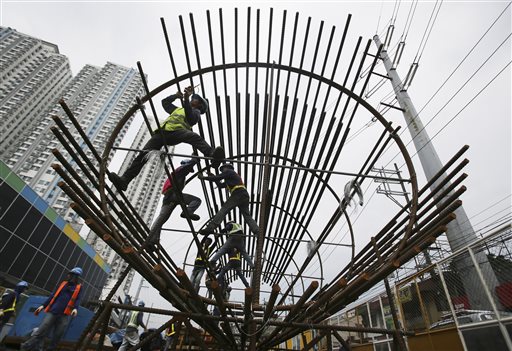
Filipino workers arrange metal rods at a government road project in suburban Quezon City, north of Manila, Philippines. AP FILE PHOTO
Tracking and monitoring government projects and contracts continue to be a challenge due to limited access to public data and information, a study by the Philippine Center for Investigative Journalism (PCIJ) revealed on Thursday.
The research titled “Public Contracting in the Philippines: Breakthroughs and Barriers,” found that agencies involved in public works, mainly the Department of Public Works and Highways (DPWH), do not publish all documents related to the procurement of infrastructure projects.
Of the 35 documents that the agencies should publish and make available to the public in accordance with the Open Contracting Data Standards (OCDS), the PCIJ found that only 21 or 60 percent were available online or obtained through a written request.
The OCDS is an open data standard created by the Open Contracting Partnership to increase transparency and allow deeper analysis of data.
The research scrutinized the level of access to information in the systems of several agencies involved in the procurement of infrastructure projects, including the Philippine Government Electronic Procurement System (PhilGEPS), Government Procurement Policy Board (GPPB), Construction Industry Authority of the Philippines (CIAP), Philippine Contractors Accreditation Board (PIAB), Commission on Audit (COA), Securities and Exchange Commission (SEC), and Department of Trade and Industry (DTI).
“Open is quite not the norm yet as the report would show in the Philippine government’s procurement or contracting process,” said PCIJ Executive Director Malou Mangahas during the launch of the study in Tomas Morato, Quezon City.
“While state agencies have started to post mass and volumes of documents online, we could wish that these are more complete or connected or timely, and certainly vested with meaningful narratives,” she added.
Overall, the Philippines only scored two of five stars in the OCDS, where government agencies provide machine-readable data.
Weak file organization
The study also found that there was a weak organization of files on agency websites, which leads to data or document dump.
Andro Santiago, assistant division chief of the Stakeholders Affairs Division, Stakeholders Relations Service of the DPWH, said agencies need to find a mechanism to organize data so response to document and data request would be easier.
“Ang isang problema namin sa aming ahensya, iba-iba ang may-ari ng dokumento. Sa planning stage, meron kaming planning service na nagmamay-ari ng dokumento, separate sila nagki-keep ng file,” Santiago said.
(One of the problems in our agency is that there are different owners of documents. In the planning stage, we have the planning service that owns the document and separately keeps the file.)
He said it would be better if agencies could tag documents with a project number so that when it is uploaded online, it would be easier to find all relevant project information.
Data Privacy Act
The Data Privacy Act of 2012 has prompted agencies to limit access to information on business and including contractors, the PCIJ study revealed.
Since the law was passed in 2012, the PCIJ said the SEC has suspended public access to its Reverse Search module, a facility that can “generate a list of corporate interests of individuals such as shareholdings and board seats in corporations.”
The module was crucial in PCIJ’s series of investigative reports on the ill-gotten wealth of former President Joseph Estrada, which led to his ouster.
The PCAB, on the other hand, stopped providing copies of contractors’ licenses to requestors early 2017.
Bright side
But on the brighter side, the PCIJ report noted that the PhilGEPS publishes key documents and databases on bids and awards “in an open, accessible, and timely manner,” albeit not fully aligned with the OCDS.
The portal makes available the several documents involved during the tender and award stages of the contracting process. /jpv
Read the full PCIJ report here: https://pcij.org/stories/big-money-for-ph-projects-no-access-to-all-documents/

